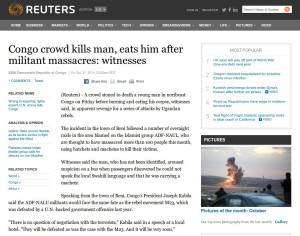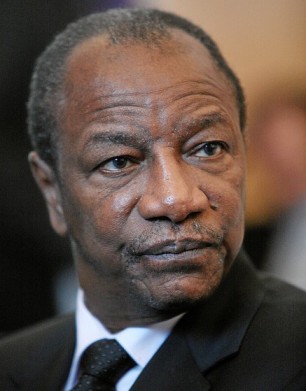by Virgil Hawkins
On 31 October, Reuters released an article headlined “Congo crowd kills man, eats him after militant massacres: witnesses”. The killing was reported as being motivated by revenge for a series of attacks and massacres perpetrated by the Allied Democratic Forces and National Army for the Liberation of Uganda (ADF-NALU) – the victim was apparently suspected of belonging to this rebel group. The incident was described in just one-fifth (roughly 100 words) of the article, with a single reference stating that the victim’s corpse had allegedly been eaten, according to “witnesses”. The vast majority of the article, however (roughly 400 words) is not about this apparent killing. It instead details the recent movements (primarily political and military) related to the conflict between the ADF-NALU and the DRC government.
The term clickbait – the misleading use of a provocative or sensationalist title aimed at enticing readers to click on a link – comes to mind, although the article does, in part, cover the actual event the headline mentions. But given the brevity of the description, and the fact that the incident is substantiated only by unnamed and unspecified “witnesses”, one is tempted to question not only the dubious use of the headline, but also how well the facts were actually checked in this case. It is certainly clear that the article was rushed through the editing process – at one point, for example, the rebels are referred to as ADF-NAUL, rather than ADF-NALU.
The Reuters story was picked up by Yahoo!, and the response (at least on the US edition of the site) was overwhelming. In just 12 hours, the article had attracted 6,448 comments. Glancing through these, one struggles to find a single comment that is even vaguely thoughtful, that attempts to seriously discuss the issues raised in the article, questions its validity, or addresses anything in the article apart from the alleged incident of cannibalism. The vast majority of the comments would fit neatly into one (or more) of the following themes: pure racism (Africans/black people have not evolved, and cannibalism is something that they generally do); genocide (sealing off the entire continent and destroying it, or leaving it to its ‘fate’); colonial apologism (this is what happens when you take away white European leadership and give them independence); patronizing charity fatigue/resignation (you try to help these people, but this is what they go and do); and obscene attempts at humour (primarily related to cannibalism).
Other recent articles describing the same conflict that were written by news agencies and had been picked up by Yahoo! (US edition), were, perhaps quite predictably, incomparable in terms of the readers’ response. One article by AFP, for example, published two weeks earlier describing a massacre of women and children in eastern DRC by the same rebel group attracted just 10 comments in total – those comments were similarly themed to those mentioned above. The responses of Yahoo! readers to the mention of violence in Africa on the whole seem to be primarily based on knee-jerk racism and stereotyping at a grand continental level, and almost invariably include a degree of genocidal thoughts and apparent colonial nostalgia. Add a brief mention of a single incident of cannibalism that may or may not have actually happened, and all this is confirmed and amplified with great vigour. While the article in question did go on to explain some of the issues associated with the conflict, in opening it played to the lowest common denominator, and this denominator turned out to be disturbingly low.
Racism is a product of ignorance, among other factors, and, given the chronic lack of information offered by the news media about Africa in general, the fact that ignorance prevails on such a large scale should not seem surprising. The little information provided about the conflict in the DRC in particular, combined with its unparalleled scale, makes it the greatest stealth conflict in the world today. But it is more than just the lack of information – it is also about the lack of balance in the little information that is provided. And this is not only an issue of balance between ‘bad news’ and ‘good news’ (something that is indeed lacking). Consideration must also be given to the balance between brief throwaway journalism (that tends to play to already entrenched stereotypes), and detailed, comprehensive and thoughtful journalism.
Horrible atrocities are a part of any armed conflict – indeed armed conflicts are by definition horrible atrocities. But as those in the journalism industry and academia calling for ‘conflict sensitive journalism’ and ‘peace journalism’ teach us, there is so much more to conflict than expressions of violence that needs to be told by the news media. Armed conflict is a complex social phenomenon, and understanding it involves getting to know the root causes (including social, economic and political inequalities), the belligerents (including their motives and objectives), the suffering of its victims, and efforts aimed at reaching a peaceful settlement, among many other aspects. The news media rarely get this balance right, but they certainly tend to do a better job for conflicts that are not occurring in Africa than those that are.
Reuters (and Yahoo!) can do better than this, and, judging by the disturbing array of comments posted in response to this article, so can the casual observer of armed conflict and atrocities.
* This article was originally posted on the Southern African Peace and Security Blog.
* Follow up: I made 3 attempts to add a comment to the original Reuters article in question, raising the same concerns as those above, and including a link to this blog entry. None were posted. I found the censorship somewhat surprising coming from such a major news organization, particularly considering that the only comment that was allowed through and that remains on the Reuters page is an offensive attempt at humour on the issue of cannibalism.
* Follow up 2 (8 Nov): Reuters has now decided to entirely eliminate the comment function from its entire site. An interesting development to say the least – certainly not a positive one.

